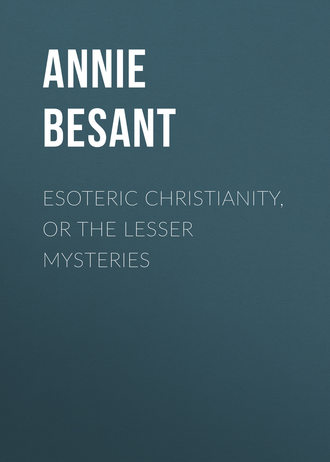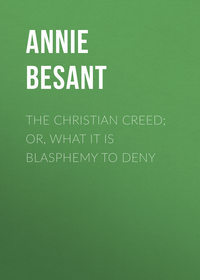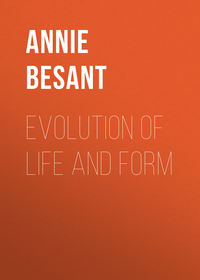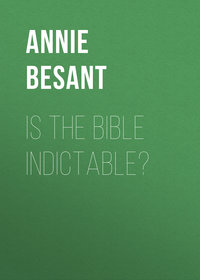 полная версия
полная версияEsoteric Christianity, or The Lesser Mysteries
So much of theory we lay down as bearing on the necessity of a hidden side in all religions. When from theory we turn to facts, we naturally ask: Has this hidden side existed in the past, forming a part of the religions of the world? The answer must be an immediate and unhesitating affirmative; every great religion has claimed to possess a hidden teaching, and has declared that it is the repository of theoretical mystic, and further of practical mystic, or occult, knowledge. The mystic explanation of popular teaching was public, and expounded the latter as an allegory, giving to crude and irrational statements and stories a meaning which the intellect could accept. Behind this theoretical mysticism, as it was behind the popular, there existed further the practical mysticism, a hidden spiritual teaching, which was only imparted under definite conditions, conditions known and published, that must be fulfilled by every candidate. S. Clement of Alexandria mentions this division of the Mysteries. After purification, he says, "are the Minor Mysteries, which have some foundation of instruction and of preliminary preparation for what is to come after; and the Great Mysteries, in which nothing remains to be learned of the universe, but only to contemplate and comprehend nature and things."9
This position cannot be controverted as regards the ancient religions. The Mysteries of Egypt were the glory of that ancient land, and the noblest sons of Greece, such as Plato, went to Saïs and to Thebes to be initiated by Egyptian Teachers of Wisdom. The Mithraic Mysteries of the Persians, the Orphic and Bacchic Mysteries and the later Eleusinian semi-Mysteries of the Greeks, the Mysteries of Samothrace, Scythia, Chaldea, are familiar in name, at least, as household words. Even in the extremely diluted form of the Eleusinian Mysteries, their value is most highly praised by the most eminent men of Greece, as Pindar, Sophocles, Isocrates, Plutarch, and Plato. Especially were they regarded as useful with regard to post-mortem existence, as the Initiated learned that which ensured his future happiness. Sopater further alleged that Initiation established a kinship of the soul with the divine Nature, and in the exoteric Hymn to Demeter covert references are made to the holy child, Iacchus, and to his death and resurrection, as dealt with in the Mysteries.10
From Iamblichus, the great theurgist of the third and fourth centuries A.D., much may be learned as to the object of the Mysteries. Theurgy was magic, "the last part of the sacerdotal science,"11 and was practised in the Greater Mysteries, to evoke the appearance of superior Beings. The theory on which these Mysteries were based may be very briefly thus stated: There is One, prior to all beings, immovable, abiding in the solitude of His own unity. From That arises the Supreme God, the Self-begotten, the Good, the Source of all things, the Root, the God of Gods, the First Cause, unfolding Himself into Light.12 From Him springs the Intelligible World, or ideal universe, the Universal Mind, the Nous and the incorporeal or intelligible Gods belong to this. From this the World-Soul, to which belong the "divine intellectual forms which are present with the visible bodies of the Gods."13 Then come various hierarchies of superhuman beings, Archangels, Archons (Rulers) or Cosmocratores, Angels, Daimons, &c. Man is a being of a lower order, allied to these in his nature, and is capable of knowing them; this knowledge was achieved in the Mysteries, and it led to union with God.14 In the Mysteries these doctrines are expounded, "the progression from, and the regression of all things to, the One, and the entire domination of the One,"15 and, further, these different Beings were evoked, and appeared, sometimes to teach, sometimes, by Their mere presence, to elevate and purify. "The Gods," says Iamblichus, "being benevolent and propitious, impart their light to theurgists in unenvying abundance, calling upwards their souls to themselves, procuring them a union with themselves, and accustoming them, while they are yet in body, to be separated from bodies, and to be led round to their eternal and intelligible principle."16 For "the soul having a twofold life, one being in conjunction with body, but the other being separate from all body,"17 it is most necessary to learn to separate it from the body, that thus it may unite itself with the Gods by its intellectual and divine part, and learn the genuine principles of knowledge, and the truths of the intelligible world.18 "The presence of the Gods, indeed, imparts to us health of body, virtue of soul, purity of intellect, and, in one word, elevates everything in us to its proper nature. It exhibits that which is not body as body to the eyes of the soul, through those of the body."19 When the Gods appear, the soul receives "a liberation from the passions, a transcendent perfection, and an energy entirely more excellent, and participates of divine love and an immense joy."20 By this we gain a divine life, and are rendered in reality divine.21
The culminating point of the Mysteries was when the Initiate became a God, whether by union with a divine Being outside himself, or by the realisation of the divine Self within him. This was termed ecstasy, and was a state of what the Indian Yogî would term high Samâdhi, the gross body being entranced and the freed soul effecting its own union with the Great One. This "ecstasy is not a faculty properly so called, it is a state of the soul, which transforms it in such a way that it then perceives what was previously hidden from it. The state will not be permanent until our union with God is irrevocable; here, in earth life, ecstasy is but a flash… Man can cease to become man, and become God; but man cannot be God and man at the same time."22 Plotinus states that he had reached this state "but three times as yet."
So also Proclus taught that the one salvation of the soul was to return to her intellectual form, and thus escape from the "circle of generation, from abundant wanderings," and reach true Being, "to the uniform and simple energy of the period of sameness, instead of the abundantly wandering motion of the period which is characterised by difference." This is the life sought by those initiated by Orpheus into the Mysteries of Bacchus and Proserpine, and this is the result of the practice of the purificatory, or cathartic, virtues.23
These virtues were necessary for the Greater Mysteries, as they concerned the purifying of the subtle body, in which the soul worked when out of the gross body. The political or practical virtues belonged to man's ordinary life, and were required to some extent before he could be a candidate even for such a School as is described below. Then came the cathartic virtues, by which the subtle body, that of the emotions and lower mind, was purified; thirdly the intellectual, belonging to the Augöeides, or the light-form of the intellect; fourthly the contemplative, or paradigmatic, by which union with God was realised. Porphyry writes: "He who energises according to the practical virtues is a worthy man; but he who energises according to the purifying virtues is an angelic man, or is also a good daimon. He who energises according to the intellectual virtues alone is a God; but he who energises according to the paradigmatic virtues is the Father of the Gods."24
Much instruction was also given in the Mysteries by the archangelic and other hierarchies, and Pythagoras, the great teacher who was initiated in India, and who gave "the knowledge of things that are" to his pledged disciples, is said to have possessed such a knowledge of music that he could use it for the controlling of men's wildest passions, and the illuminating of their minds. Of this, instances are given by Iamblichus in his Life of Pythagoras. It seems probable that the title of Theodidaktos, given to Ammonius Saccas, the master of Plotinus, referred less to the sublimity of his teachings than to this divine instruction received by him in the Mysteries.
Some of the symbols used are explained by Iamblichus,25 who bids Porphyry remove from his thought the image of the thing symbolised and reach its intellectual meaning. Thus "mire" meant everything that was bodily and material; the "God sitting above the lotus" signified that God transcended both the mire and the intellect, symbolised by the lotus, and was established in Himself, being seated. If "sailing in a ship," His rule over the world was pictured. And so on.26 On this use of symbols Proclus remarks that "the Orphic method aimed at revealing divine things by means of symbols, a method common to all writers of divine lore."27
The Pythagorean School in Magna Græcia was closed at the end of the sixth century B.C., owing to the persecution of the civil power, but other communities existed, keeping up the sacred tradition.28 Mead states that Plato intellectualised it, in order to protect it from an increasing profanation, and the Eleusinian rites preserved some of its forms, having lost its substance. The Neo-Platonists inherited from Pythagoras and Plato, and their works should be studied by those who would realise something of the grandeur and the beauty preserved for the world in the Mysteries.
The Pythagorean School itself may serve as a type of the discipline enforced. On this Mead gives many interesting details,29 and remarks: "The authors of antiquity are agreed that this discipline had succeeded in producing the highest examples, not only of the purest chastity and sentiment, but also a simplicity of manners, a delicacy, and a taste for serious pursuits which was unparalleled. This is admitted even by Christian writers." The School had outer disciples, leading the family and social life, and the above quotation refers to these. In the inner School were three degrees – the first of Hearers, who studied for two years in silence, doing their best to master the teachings; the second degree was of Mathematici, wherein were taught geometry and music, the nature of number, form, colour, and sound; the third degree was of Physici, who mastered cosmogony and metaphysics. This led up to the true Mysteries. Candidates for the School must be "of an unblemished reputation and of a contented disposition."
The close identity between the methods and aims pursued in these various Mysteries and those of Yoga in India is patent to the most superficial observer. It is not, however, necessary to suppose that the nations of antiquity drew from India; all alike drew from the one source, the Grand Lodge of Central Asia, which sent out its Initiates to every land. They all taught the same doctrines, and pursued the same methods, leading to the same ends. But there was much intercommunication between the Initiates of all nations, and there was a common language and a common symbolism. Thus Pythagoras journeyed among the Indians, and received in India a high Initiation, and Apollonius of Tyana later followed in his steps. Quite Indian in phrase as well as thought were the dying words of Plotinus: "Now I seek to lead back the Self within me to the All-self."30
Among the Hindus the duty of teaching the supreme knowledge only to the worthy was strictly insisted on. "The deepest mystery of the end of knowledge … is not to be declared to one who is not a son or a pupil, and who is not tranquil in mind."31 So again, after a sketch of Yoga we read: "Stand up! awake! having found the Great Ones, listen! The road is as difficult to tread as the sharp edge of a razor. Thus say the wise."32 The Teacher is needed, for written teaching alone does not suffice. The "end of knowledge" is to know God – not only to believe; to become one with God – not only to worship afar off. Man must know the reality of the divine Existence, and then know – not only vaguely believe and hope – that his own innermost Self is one with God, and that the aim of life is to realise that unity. Unless religion can guide a man to that realisation, it is but "as sounding brass or a tinkling cymbal."33
So also it was asserted that man should learn to leave the gross body: "Let a man with firmness separate it [the soul] from his own body, as a grass-stalk from its sheath."34 And it was written! "In the golden highest sheath dwells the stainless, changeless Brahman; It is the radiant white Light of lights, known to the knowers of the Self."35 "When the seer sees the golden-coloured Creator, the Lord, the Spirit, whose womb is Brahman, then, having thrown away merit and demerit, stainless, the wise one reaches the highest union."36
Nor were the Hebrews without their secret knowledge and their Schools of Initiation. The company of prophets at Naioth presided over by Samuel37 formed such a School, and the oral teaching was handed down by them. Similar Schools existed at Bethel and Jericho,38 and in Cruden's Concordance39 there is the following interesting note: "The Schools or Colleges of the prophets are the first [schools] of which we have any account in Scripture; where the children of the prophets, that is, their disciples, lived in the exercises of a retired and austere life, in study and meditation, and reading of the law of God… These Schools, or Societies, of the prophets were succeeded by the Synagogues." The Kabbala, which contains the semi-public teaching, is, as it now stands, a modern compilation, part of it being the work of Rabbi Moses de Leon, who died A.D. 1305. It consists of five books, Bahir, Zohar, Sepher Sephiroth, Sepher Yetzirah, and Asch Metzareth, and is asserted to have been transmitted orally from very ancient times – as antiquity is reckoned historically. Dr. Wynn Westcott says that "Hebrew tradition assigns the oldest parts of the Zohar to a date antecedent to the building of the second Temple;" and Rabbi Simeon ben Jochai is said to have written down some of it in the first century A.D. The Sepher Yetzirah is spoken of by Saadjah Gaon, who died A.D. 940, as "very ancient."40 Some portions of the ancient oral teaching have been incorporated in the Kabbala as it now stands, but the true archaic wisdom of the Hebrews remains in the guardianship of a few of the true sons of Israel.
Brief as is this outline, it is sufficient to show the existence of a hidden side in the religions of the world outside Christianity, and we may now examine the question whether Christianity was an exception to this universal rule.
Chapter II.
THE HIDDEN SIDE OF CHRISTIANITY
(a) The Testimony of the ScripturesHaving seen that the religions of the past claimed with one voice to have a hidden side, to be custodians of "Mysteries," and that this claim was endorsed by the seeking of initiation by the greatest men, we must now ascertain whether Christianity stands outside this circle of religions, and alone is without a Gnosis, offering to the world only a simple faith and not a profound knowledge. Were it so, it would indeed be a sad and lamentable fact, proving Christianity to be intended for a class only, and not for all types of human beings. But that it is not so, we shall be able to prove beyond the possibility of rational doubt.
And that proof is the thing which Christendom at this time most sorely needs, for the very flower of Christendom is perishing for lack of knowledge. If the esoteric teaching can be re-established and win patient and earnest students, it will not be long before the occult is also restored. Disciples of the Lesser Mysteries will become candidates for the Greater, and with the regaining of knowledge will come again the authority of teaching. And truly the need is great. For, looking at the world around us, we find that religion in the West is suffering from the very difficulty that theoretically we should expect to find. Christianity, having lost its mystic and esoteric teaching, is losing its hold on a large number of the more highly educated, and the partial revival during the past few years is co-incident with the re-introduction of some mystic teaching. It is patent to every student of the closing forty years of the last century, that crowds of thoughtful and moral people have slipped away from the churches, because the teachings they received there outraged their intelligence and shocked their moral sense. It is idle to pretend that the wide-spread agnosticism of this period had its root either in lack of morality or in deliberate crookedness of mind. Everyone who carefully studies the phenomena presented will admit that men of strong intellect have been driven out of Christianity by the crudity of the religious ideas set before them, the contradictions in the authoritative teachings, the views as to God, man, and the universe that no trained intelligence could possibly admit. Nor can it be said that any kind of moral degradation lay at the root of the revolt against the dogmas of the Church. The rebels were not too bad for their religion; on the contrary, it was the religion that was too bad for them. The rebellion against popular Christianity was due to the awakening and the growth of conscience; it was the conscience that revolted, as well as the intelligence, against teachings dishonouring to God and man alike, that represented God as a tyrant, and man as essentially evil, gaining salvation by slavish submission.
The reason for this revolt lay in the gradual descent of Christian teaching into so-called simplicity, so that the most ignorant might be able to grasp it. Protestant religionists asserted loudly that nothing ought to be preached save that which every one could grasp, that the glory of the Gospel lay in its simplicity, and that the child and the unlearned ought to be able to understand and apply it to life. True enough, if by this it were meant that there are some religious truths that all can grasp, and that a religion fails if it leaves the lowest, the most ignorant, the most dull, outside the pale of its elevating influence. But false, utterly false, if by this it be meant that religion has no truths that the ignorant cannot understand, that it is so poor and limited a thing that it has nothing to teach which is above the thought of the unintelligent or above the moral purview of the degraded. False, fatally false, if such be the meaning; for as that view spreads, occupying the pulpits and being sounded in the churches, many noble men and women, whose hearts are half-broken as they sever the links that bind them to their early faith, withdraw from the churches, and leave their places to be filled by the hypocritical and the ignorant. They pass either into a state of passive agnosticism, or – if they be young and enthusiastic – into a condition of active aggression, not believing that that can be the highest which outrages alike intellect and conscience, and preferring the honesty of open unbelief to the drugging of the intellect and the conscience at the bidding of an authority in which they recognise nothing that is divine.
In thus studying the thought of our time we see that the question of a hidden teaching in connection with Christianity becomes of vital importance. Is Christianity to survive as the religion of the West? Is it to live through the centuries of the future, and to continue to play a part in moulding the thought of the evolving western races? If it is to live, it must regain the knowledge it has lost, and again have its mystic and its occult teachings; it must again stand forth as an authoritative teacher of spiritual verities, clothed with the only authority worth anything, the authority of knowledge. If these teachings be regained, their influence will soon be seen in wider and deeper views of truth; dogmas, which now seem like mere shells and fetters, shall again be seen to be partial presentments of fundamental realities. First, Esoteric Christianity will reappear in the "Holy Place," in the Temple, so that all who are capable of receiving it may follow its lines of published thought; and secondly, Occult Christianity will again descend into the Adytum, dwelling behind the Veil which guards the "Holy of Holies," into which only the Initiate may enter. Then again will occult teaching be within the reach of those who qualify themselves to receive it, according to the ancient rules, those who are willing in modern days to meet the ancient demands, made on all those who would fain know the reality and truth of spiritual things.
Once again we turn our eyes to history, to see whether Christianity was unique among religions in having no inner teaching, or whether it resembled all others in possessing this hidden treasure. Such a question is a matter of evidence, not of theory, and must be decided by the authority of the existing documents and not by the mere ipse dixit of modern Christians.
As a matter of fact both the "New Testament" and the writings of the early Church make the same declarations as to the possession by the Church of such teachings, and we learn from these the fact of the existence of Mysteries – called the Mysteries of Jesus, or the Mystery of the Kingdom – the conditions imposed on candidates, something of the general nature of the teachings given, and other details. Certain passages in the "New Testament" would remain entirely obscure, if it were not for the light thrown on them by the definite statements of the Fathers and Bishops of the Church, but in that light they became clear and intelligible.
It would indeed have been strange had it been otherwise when we consider the lines of religious thought which influenced primitive Christianity. Allied to the Hebrews, the Persians, and the Greeks, tinged by the older faiths of India, deeply coloured by Syrian and Egyptian thought, this later branch of the great religious stem could not do other than again re-affirm the ancient traditions, and place in the grasp of western races the full treasure of the ancient teaching. "The faith once delivered to the saints" would indeed have been shorn of its chief value if, when delivered to the West, the pearl of esoteric teaching had been withheld.
The first evidence to be examined is that of the "New Testament." For our purpose we may put aside all the vexed questions of different readings and different authors, that can only be decided by scholars. Critical scholarship has much to say on the age of MSS., on the authenticity of documents, and so on. But we need not concern ourselves with these. We may accept the canonical Scriptures, as showing what was believed in the early Church as to the teaching of the Christ and of His immediate followers, and see what they say as to the existence of a secret teaching given only to the few. Having seen the words put into the mouth of Jesus Himself, and regarded by the Church as of supreme authority, we will look at the writings of the great apostle S. Paul; then we will consider the statements made by those who inherited the apostolic tradition and guided the Church during the first centuries A.D. Along this unbroken line of tradition and written testimony the proposition that Christianity had a hidden side can be established. We shall further find that the Lesser Mysteries of mystic interpretation can be traced through the centuries to the beginning of the 19th century, and that though there were no Schools of Mysticism recognised as preparatory to Initiation, after the disappearance of the Mysteries, yet great Mystics, from time to time, reached the lower stages of exstasy, by their own sustained efforts, aided doubtless by invisible Teachers.
The words of the Master Himself are clear and definite, and were, as we shall see, quoted by Origen as referring to the secret teaching preserved in the Church. "And when he was alone, they that were about Him with the twelve asked of Him the parable. And He said unto them, 'Unto you it is given to know the mystery of the kingdom of God, but unto them that are without, all these things are done in parables.'" And later: "With many such parables spake He the word unto them, as they were able to hear it. But without a parable spake He not unto them; and when they were alone He expounded all things to His disciples."41 Mark the significant words, "when they were alone," and the phrase, "them that are without." So also in the version of S. Matthew: "Jesus sent the multitude away, and went into the house; and His disciples came unto Him." These teachings given "in the house," the innermost meanings of His instructions, were alleged to be handed on from teacher to teacher. The Gospel gives, it will be noted, the allegorical mystic explanation, that which we have called The Lesser Mysteries, but the deeper meaning was said to be given only to the Initiates.






